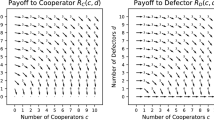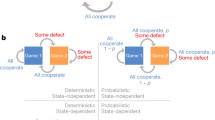Abstract
How can cooperation be achieved between self-interested individuals in commonly-occurring asymmetric interactions where agents have different positions? Should agents use the same strategies that are appropriate for symmetric social situations? We explore these questions through the asymmetric interaction captured in the indefinitely repeated investment game (IG). In every period of this game, the first player decides how much of an endowment he wants to invest, then this amount is tripled and passed to the second player, who finally decides how much of the tripled investment she wants to return to the first player. The results of three evolutionary studies demonstrate that the best-performing strategies for this asymmetric game differ from those for a similar but symmetric game, the indefinitely repeated Prisoner’s dilemma game. The strategies that enable cooperation for the asymmetric IG react more sensitively to exploitation, meaning that cooperation can more easily break down. Furthermore, once cooperation has stopped, it is much more difficult to reestablish than in symmetric situations. Based on these results, the presence of asymmetry in an interaction appears to be an important factor affecting adaptive behavior in these common social situations.
Similar content being viewed by others
References
D. Abreu A. Rubinstein (1988) ArticleTitleThe structure of Nash equilibrium in repeated games with finite automata Econometrica 56 1259–1281
C. A. Aktipis (2004) ArticleTitleWhen to walk away: contingent movement and the evolution of cooperation Journal of Theoretical Biology 231 249–260 Occurrence Handle10.1016/j.jtbi.2004.06.020
R. D. Alexander (1987) The Biology of Moral Systems Aldine de Gruyter New York
Aumann, R. J. (1981), Survey of repeated games, In Essays in Game Theory and Mathematical Economic in Honor of Oskar Morgenstern, Bibliographisches Institut. Wissenschaftsverlag, Mannheim, pp. 11–42.
R. Axelrod (1984) The Evolution of Cooperation Basic Books New York
R. Axelrod (1987) The evolution of strategies in the iterated Prisoner’s dilemma L. Davis (Eds) Genetic Algorithms: A Simulated Annealing Pitman London 32–41
J. Bendor P. Swistak (1998) ArticleTitleEvolutionary equilibria: characterization theorems and their implications Theory and Decision 45 99–159 Occurrence Handle10.1023/A:1005083323183
J. Berg J. W. Dickhaut K. A. McCabe (1995) ArticleTitleTrust, reciprocity, and social history Games and Economic Behavior 10 122–142 Occurrence Handle10.1006/game.1995.1027
K. Binmore (1994) Game Theory and the Social Contract. Volume 1 Playing fair MIT Press Cambridge, MA
K. Binmore L. Samuelson (1992) ArticleTitleEvolutionary stability in repeated games played by finite automata Journal of Economic Theory 57 278–305 Occurrence Handle10.1016/0022-0531(92)90037-I
R. Boyd (1989) ArticleTitleMistakes allow evolutionary stability in the repeated Prisoner’s dilemma game Journal of Theoretical Biology 136 47–56
R. Boyd J. P. Lorberbaum (1987) ArticleTitleNo pure strategy is evolutionarily stable in the repeated Prisoner’s dilemma game Nature 327 58–59 Occurrence Handle10.1038/327058a0
D. B. Bugental (2000) ArticleTitleAcquisition of the algorithms of social life: a domain-based approach Psychological Bulletin 126 187–219
J. Cohen (1988) Statistical Power Analysis for the Behavioral Sciences Lawrence Erlbaum Associates Hillsdale, NJ
M. Deutsch (1975) ArticleTitleEquity, equality, and need: What determines which value will be used as the basis of distributive justice? Journal of Social Issues 31 137–149
E. Fehr S. Gächter G. Kirchsteiger (1997) ArticleTitleReciprocity as a contract enforcement device: Experimental evidence Econometrica 65 833–860
A. P. Fiske (1992) ArticleTitleThe four elementary forms of sociality: framework for a unified theory of social relations Psychological Review 99 689–723 Occurrence Handle10.1037/0033-295X.99.4.689
D. Fudenberg J. Tirole (1991) Game Theory MIT Press Cambridge, MA
D. E. Goldberg (1989) Genetic Algorithms in Search, Optimization, and Machine Learning Addison-Wesley Reading, MA
D. E. Goldberg K. Deb (1991) A comparison of selection schemes used in genetic algorithms G.J.E. Rawlins (Eds) Foundations of Genetic Algorithms Morgan Kaufmann San Mateo, CA 69–93
W. Güth H. Kliemt (2000) ArticleTitleEvolutionarily stable co-operative commitments Theory and Decision 49 197–221 Occurrence Handle10.1023/A:1026570914311
W. Güth P. Ockenfels M. Wendel (1997) ArticleTitleCooperation based on trust. An experimental investigation Journal of Economic Psychology 18 15–43
W. Güth R. Schmittberger R. Schwarz (1982) ArticleTitleAn experimental analysis of ultimatum bargaining Journal of Economic Behavior and Organization 3 367–388 Occurrence Handle10.1016/0167-2681(82)90011-7
L. A. Hirschfeld S. A. Gelman (Eds) (1994) Mapping the Mind: Domain Specificity in Cognition and Culture Cambridge University Press New York
R. Hoffmann (1999) ArticleTitleThe independent localisations of interaction and learning in the repeated Prisoner’s Dilemma Theory and Decision 47 57–72 Occurrence Handle10.1023/A:1005008122139
R. Hoffmann (2001) ArticleTitleThe ecology of cooperation Theory and Decision 50 101–118 Occurrence Handle10.1023/A:1010353814597
J. E. Hopcroft J. D. Ullman (1979) Introduction to Automata Theory, Languages, and Computation Addison-Wesley Reading, MA
D. Kraines V. Kraines (1993) ArticleTitleLearning to cooperate with Pavlov: an adaptive strategy for the iterated Prisoner’s Dilemma with noise Theory and Decision 35 107–150 Occurrence Handle10.1007/BF01074955
D. Kraines V. Kraines (1995) ArticleTitleEvolution of learning among Pavlov strategies in a competitive environment with noise Journal of Conflict Resolution 39 439–466
J. O. Ledyard (1995) Public goods: a survey of experimental results J. H. Kagel A. E. Roth (Eds) The Handbook of Experimental Economics Princeton University Press Princeton, NJ 111–194
O. Leimar (1997) ArticleTitleRepeated games: a state space approach Journal of Theoretical Biology 184 471–498 Occurrence Handle10.1006/jtbi.1996.0286
K. Lindgren (1991) Evolutionary phenomena in simple dynamics C. G. Langton C. Taylor J. D. Farmer S. Rasmussen (Eds) Artificial Life II Addison-Wesley Reading, MA 295–312
B. G. Linster (1992) ArticleTitleEvolutionary stability in the infinitely repeated Prisoner’s dilemma played by two-state Moore machines Southern Economic Journal 58 880–903
J. Lorberbaum (1994) ArticleTitleNo strategy is evolutionarily stable in the repeated Prisoner’s dilemma Journal of Theoretical Biology 168 117–130 Occurrence Handle10.1006/jtbi.1994.1092
R. D. Luce H. Raiffa (1957) Games and Decision Wiley New York
L. Marinoff (1990) ArticleTitleThe inapplicability of evolutionarily stable strategy to the Prisoner’s dilemma British Journal of Philosophy of Science 41 461–472
J. Maynard Smith (1984) ArticleTitleGame theory and the evolution of behaviour Behavioral and Brain Sciences 7 95–125
J. Maynard Smith G. R. Price (1973) ArticleTitleThe logic of animal conflict Nature 246 15–18
Z. Michalewicy (1996) Genetic Algorithms + Data Structures = Evolution Programs EditionNumber3 Springer Berlin
M. Mitchell (1996) An Introduction to Genetic Algorithms MIT Press Cambridge, MA
R. J. Nelson (1975) ArticleTitleBehaviorism, finite automata, and stimulus theory Theory and Decision 6 249–267 Occurrence Handle10.1007/BF00136197
M. A. Nowak R. M. May (1992) ArticleTitleEvolutionary games and spatial chaos Nature 359 826–829 Occurrence Handle10.1038/359826a0
M. A. Nowak K. Sigmund (1993) ArticleTitleA strategy of win-stay, lose-shift that outperforms tit-for-tat in the Prisoner’s Dilemma game Nature 364 56–58 Occurrence Handle10.1038/364056a0
M. A. Nowak K. Sigmund (1994) ArticleTitleThe alternating Prisoner’s Dilemma Journal of Theoretical Biology 168 219–326 Occurrence Handle10.1006/jtbi.1994.1101
J. Ochs A. Roth (1989) ArticleTitleAn experimental study of sequential bargaining American Economic Review 79 355–384
Rieskamp, J. and Gigerenzer, G. (2005), Heutistics for social interaction: How to generate trust and fairness. Manuscript submitted for publication.
L. Samuelson (1991) ArticleTitleLimit evolutionarily stable strategies in two-player, normal form games Games and Economic Behavior 3 110–128 Occurrence Handle10.1016/0899-8256(91)90008-3
L. Samuelson (1997) Evolutionary Games and Equilibrium Selection MIT Press Cambridge, MA
T. C. Schelling (1960) The Strategy of Conflict Harvard University Press Cambridge, MA
R. Selten (1983) ArticleTitleEvolutionary stability in extensive two-person games Mathematical Social Sciences 5 269–363 Occurrence Handle10.1016/0165-4896(83)90012-4
R. Selten (1988) ArticleTitleEvolutionary stability in extensive two-person games—Correction and further development Mathematical Social Sciences 16 223–266 Occurrence Handle10.1016/0165-4896(88)90040-6
E. Sober (1992) ArticleTitleStable cooperation in iterated Prisoner’s Dilemmas Economics and Philosophy 8 127–139
R. Sugden (1986) The Economics of Rights, Cooperation, and Welfare Basil Blackwell Oxford
P. Suppes (1969) ArticleTitleStimulus-response theory of finite automata Journal of Mathematical Psychology 6 327–355 Occurrence Handle10.1016/0022-2496(69)90010-8
R. L. Trivers (1971) ArticleTitleThe evolution of reciprocal altruism The Quarterly Review of Biology 46 35–57
J. B. Huyck ParticleVan R. C. Battalio M. F. Walters (1995) ArticleTitleCommitment versus discretion in the peasant-dictator game Games and Economic Behavior 10 143–170
J. W. Weibull (1995) Evolutionary Game Theory MIT Press Cambridge, MA
H. P. Young D. Foster (1991) ArticleTitleCooperation in the short and in the long run Games and Economic Behavior 3 145–156
Author information
Authors and Affiliations
Corresponding author
Rights and permissions
About this article
Cite this article
Rieskamp, J., Todd, P.M. The Evolution of Cooperative Strategies for Asymmetric Social Interactions. Theor Decis 60, 69–111 (2006). https://doi.org/10.1007/s11238-005-6014-6
Issue Date:
DOI: https://doi.org/10.1007/s11238-005-6014-6




